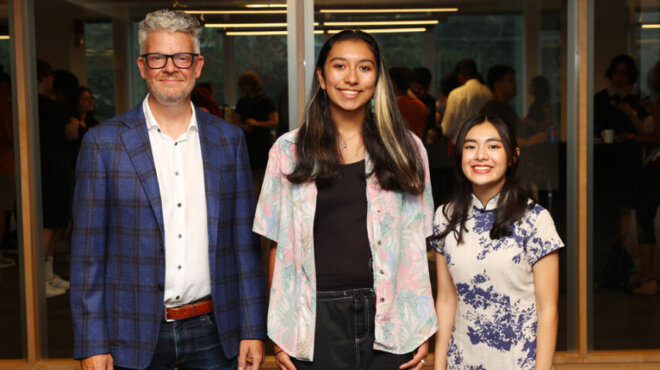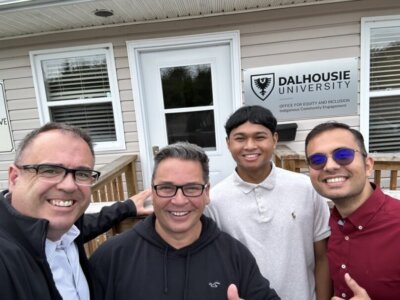
Creating inclusive opportunities in computer science
Dalhousie Computer Science, CGI, and Millbrook First Nation team up to increase diversity in tech and create an unforgettable co-op experience.
By Jodi Reid | For Giving Power
Dalhousie’s Faculty of Computer Science and technology/business consulting firm CGI share a long, productive relationship. It has focused on developing tech talent and increasing diversity and inclusivity in the tech sector. CGI has employed many Dalhousie co-op students and graduates, and has been an active supporter of Dalhousie initiatives such as Women in Technology and WeAreAllCS.
Keen to do even more, Dalhousie and CGI created the CGI Fund for Inclusive Opportunities.
“We wanted to broaden and evolve our post-secondary talent development strategy, provide more opportunities for equity-seeking groups, and give back to the communities where we live,” says Jonathan Feindel (BComm’91), Director of Consulting at CGI.
Opportunities for good
The CGI Fund for Inclusive Opportunities includes three key components: scholarships for under-represented student populations in computer science (e.g., women, people of African descent, members of Indigenous communities); “Co-op for Good,” which provides co-op talent for non-profit or community groups; and outreach initiatives that promote careers in computer science.
The program has already achieved impressive milestones. The first CGI-funded scholarships were awarded to three Dalhousie computer science students, and the Co-op for Good program launched with the hiring of two students for the fall 2023 term.
Co-op for Good represents an innovative new approach for Dalhousie. The Faculty of Computer Science hires and is the official employer of the co-op students, while CGI provides funding for student salaries as well as technical expertise and mentorship for the students. A CGI employee – Feindel for this project – serves as the students’ technical supervisor, while faculty members Drs. Angela Siegel and Christine Farion are their Dal supervisors. The community group role varies by project.
Dalhousie approached the Millbrook First Nation to consider being the project’s first community collaborator. Dal and Millbrook have worked together in many capacities over the years – in fact, Dal’s Office for Equity and Inclusion established an office in Millbrook to serve as space for Indigenous community engagement.
Perfect timing
Art Stevens (BSAg’10) is the Director of Educational Services at the Millbrook First Nation Administration Office. Part of his role is advising and supporting over 630 K-12 and post-secondary students from Millbrook.
When he first assumed the role, Stevens faced stacks of paper files containing student information. He needed to improve processes but knew the Office lacked HR capacity to take on the huge task. Stevens started looking at potentially hiring consultants to digitize the records and find solutions for creating useable databases.
“There was a lot to navigate with the student information, which had largely been done by hand, on paper,” says Stevens. “Then along came that call from Dalhousie about a community co-op with computer science students. It was a perfect fit, so I told them all about this project on my plate.”
The initial goal is to digitize all Millbrook student files and records for more efficient and effective access.
“My ideal system would be a student portal – a record system for tracking, archiving and reporting,” Stevens explains. “Having it stored in the cloud would reduce worry about data getting lost or damaged.”
As a former Dalhousie student and employee, Stevens was familiar with how the university operates.
“Engagement with Dalhousie has always been very reciprocal and respectful,” he says. “They consider our perspective and what we as an Indigenous community would like to see, as opposed to chasing their own agenda. I’m grateful to partner with Dalhousie and CGI on this project.”
The first do-gooders
Mayank Ramchandani and Adonis Aggabao are fourth-year computer science students (Ramchandani also majors in neuroscience), and say they were thrilled to be the inaugural Co-op for Good students.

L-R: Jonathan Feindel, CGI; Art Stevens, Millbrook First Nation; and Co-op for Good students Adonis Aggabao and Mayank Ramchandani.
“To work with an Indigenous community and help them transform the way they handle data particularly appealed to me,” says Ramchandani. “I have always wanted to use technology for a meaningful purpose, and this opportunity was perfect for that, as the program title promises.”
The students’ co-op education extends far beyond their computers. Growing up in nearby Truro, Aggabao regularly attended Mi’kmaq assemblies at school. For Ramchandani, who grew up in Dubai, the co-op was his first significant interaction with an Indigenous community in Canada.
“I have really enjoyed the exposure to the rich and vibrant Mi’kmaq culture and language, especially when we visited the Millbrook Cultural & Heritage Centre,” says Ramchandani. He says he was impressed by the regalia displays and fascinated by the work of Millbrook leaders such as Nora Bernard.
The students note that having access to direct mentorship from CGI – one of Canada’s largest IT services and consulting companies – has provided invaluable insights into industry trends, best practices, and innovative technologies.
“Immersing myself in real-world challenges has helped me grow as a student and person,” says Aggabao. “The challenges we are working on have enhanced my problem-solving skills. Working alongside members from Millbrook, CGI, and Dalhousie has been great. I am thankful my managers make time to meet with us regularly in person.”
Inclusive opportunities ahead
Co-op for Good will continue over three terms, with two co-op students working in Millbrook each term. Dalhousie, CGI, and the students will work with Millbrook to determine future priorities, such as files in health, fisheries, and housing.
“Knowing we’ll have access to our own information in real time gives our community a feeling of empowerment,” Stevens says. “For the students, we want to always have some cultural exchange so they gain lived experience within our community and our ways of knowing. That’s something they’ll take with them when they move on – and maybe one day they might consider working with an Indigenous community again.”
Feindel is already planning for next semester’s Co-op for Good and community outreach activities.
“We’ve had some learnings about how we execute the programs, but I think all parties would agree that current progress has been excellent,” Feindel says. “We are very optimistic that we’ll make a difference with these initiatives.”
The CGI Fund for Inclusive Opportunities will result in many more positives as the program develops, but for the students and partners, it’s been so far, so “Good.”